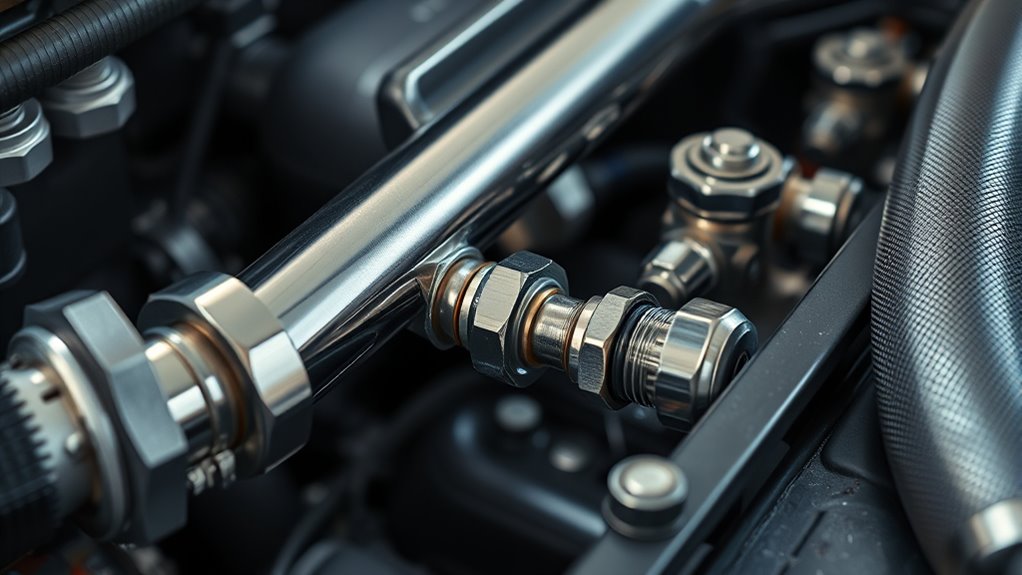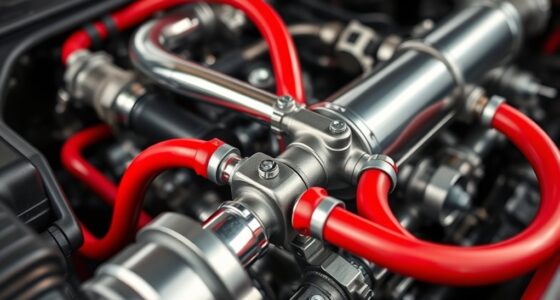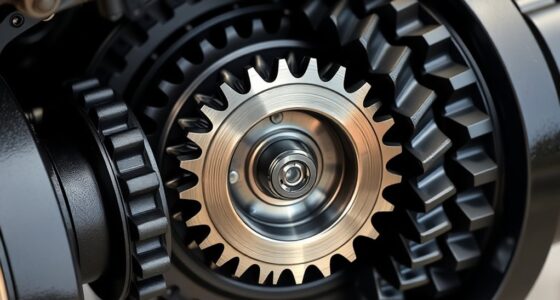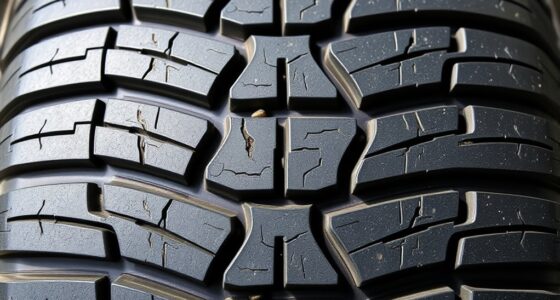A fuel system supplies your engine with the right amount of fuel for smooth running and efficiency. It includes components like the fuel pump, lines, and injectors, which work together to guarantee the fuel is delivered at the correct pressure and timing. The system’s regulation maintains stable performance, preventing issues like misfires or poor economy. Understanding how these parts operate will help you grasp how your vehicle stays powerful and reliable—if you continue exploring, you’ll discover even more details.
Key Takeaways
- The fuel system stores, delivers, and regulates fuel for optimal engine performance.
- Electric fuel pumps in the tank ensure steady, pressurized fuel flow to the injectors.
- Fuel injectors precisely introduce fuel into the engine via port or direct injection methods.
- Pressure regulation maintains consistent fuel pressure, critical for efficient combustion.
- Regular maintenance of the fuel pump and injectors ensures smooth engine operation and performance.

A fuel system is a critical component of any vehicle or engine, responsible for storing, delivering, and regulating fuel to guarantee ideal performance. At the heart of this system lies the fuel injection process, which determines how fuel mixes with air and enters the combustion chamber. Unlike older carburetor systems, fuel injection offers precise control, improving efficiency and power while reducing emissions. When the engine calls for fuel, the fuel pump sends pressurized fuel from the tank through fuel lines to the injectors. This pump plays a vital role, ensuring a steady, reliable flow of fuel at the right pressure for optimal combustion. The fuel pump can be mechanical or electric, with modern vehicles predominantly using electric pumps located inside the fuel tank. These pumps are designed to activate only when needed, conserving energy and reducing wear. When you start your vehicle, the fuel pump quickly primes the system, creating the necessary pressure for the injectors to operate correctly. This pressure is crucial because it affects how finely the fuel is atomized, directly impacting engine performance and fuel economy. Once the fuel reaches the injectors, the engine control unit (ECU) precisely times their opening and closing, injecting the right amount of fuel at the perfect moment during each combustion cycle. Proper fuel pressure regulation is essential for maintaining consistent engine performance and efficiency. Fuel injection systems come in various types, including port fuel injection and direct injection. Port fuel injection sprays fuel into the intake manifold, where it mixes with air before entering the cylinders. Direct injection, on the other hand, delivers fuel directly into the combustion chamber, allowing for more precise control and better efficiency, especially at higher pressures. Regardless of the type, the key is that the system must maintain consistent pressure and timing, which hinges on a properly functioning fuel pump and accurate control signals from the ECU. You’ll notice that as your vehicle runs smoothly and efficiently, it’s because of this well-orchestrated process involving fuel injection and a dependable fuel pump. If either component fails or malfunctions, your engine’s performance drops considerably, leading to issues like misfires, poor fuel economy, or difficulty starting. Regular maintenance, including checking the fuel pump and ensuring the fuel injection system is clean and functioning correctly, helps keep your engine running at peak performance. In essence, understanding how these components work together helps you appreciate the complexity behind a smooth-running engine and the importance of a reliable fuel system.
Frequently Asked Questions
How Often Should I Replace My Fuel Filter?
You should replace your fuel filter every 20,000 to 30,000 miles, depending on your vehicle’s manufacturer recommendations. Regular fuel filter maintenance helps prevent clogs and keeps your engine running smoothly. Check your owner’s manual for specific replacement intervals, as driving conditions can affect this schedule. If you notice symptoms like poor acceleration or engine stalling, it’s a good idea to replace the filter sooner to maintain peak performance.
What Are Signs of a Failing Fuel Pump?
Did you know that about 80% of vehicle breakdowns are caused by fuel system issues? If your fuel pump is failing, you’ll notice engine hesitation, difficulty starting, or sudden stalling. These symptoms directly impact fuel efficiency, making your car less economical. Listen for whining noises or irregular acceleration, which are signs your fuel pump might be on the fritz. Addressing these early keeps your engine running smoothly and saves you money.
How Does Altitude Affect Fuel System Performance?
Altitude effects your fuel system by reducing air pressure, which can lead to incomplete fuel vaporization. You might notice the engine running rough or losing power at higher elevations. As altitude increases, fuel may not mix properly with air, causing performance issues. To counteract this, guarantee your fuel system is properly maintained and consider adjustments like altitude-compensating fuel systems to improve vaporization and overall efficiency.
Can Contaminated Fuel Damage My Engine?
Yes, contaminated fuel can damage your engine. Fuel contamination introduces dirt, water, or other impurities that clog filters, injectors, and fuel lines. This can lead to poor combustion, engine misfires, or even severe engine damage if not addressed promptly. To protect your engine, always guarantee your fuel is clean and free of contaminants, and regularly inspect and maintain your fuel system.
What Are the Benefits of Using Ethanol-Blended Fuel?
Using ethanol-blended fuel offers notable ethanol benefits, such as reducing emissions and supporting renewable energy sources. It can also improve fuel efficiency by providing better combustion in your engine. You might notice better mileage and smoother engine performance. However, be mindful of potential effects on certain engine components. Overall, ethanol-blended fuels can be a good choice for eco-conscious drivers seeking enhanced fuel efficiency and environmental benefits.
Conclusion
Understanding your fuel system helps you appreciate how your vehicle runs smoothly. Did you know that a typical car’s fuel system can deliver up to 60 gallons of fuel per hour? That’s enough to fill a bathtub in just a few minutes! By keeping it in good condition, you guarantee ideal performance and efficiency. So, take care of your fuel system, and it’ll keep your engine running reliably mile after mile.









